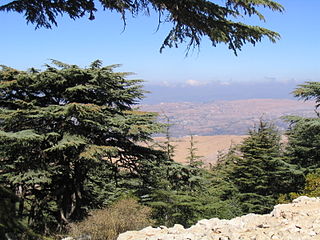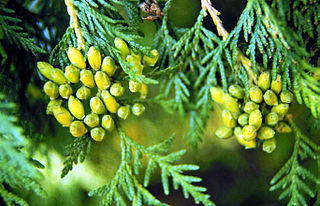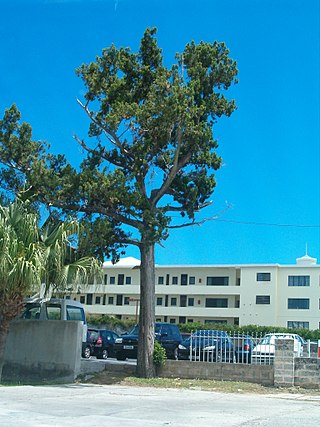
Cedrus, with the common English name cedar, is a genus of coniferous trees in the plant family Pinaceae. They are native to the mountains of the western Himalayas and the Mediterranean region, occurring at altitudes of 1,500–3,200 m (4,900–10,500 ft) in the Himalayas and 1,000–2,200 m (3,300–7,200 ft) in the Mediterranean.
The Outer Limits or Outer Limits may refer to:
Cypress is a common name for various coniferous trees or shrubs from the Cupressus genus of the Cupressaceae family, typically found in warm-temperate and subtropical regions of Asia, Europe, and North America.

Chamaecyparis thyoides, a species of Cupressaceae, is native to the Atlantic coast of North America and is found from southern Maine to Georgia and along the Gulf of Mexico coast from Florida to Mississippi. It is one of two species of Chamaecyparis found in North America. C. thyoides resides on the East Coast and C. lawsoniana can be found on the West Coast. There are two geographically isolated subspecies, treated by some botanists as distinct species, by others at just varietal rank: Chamaecyparis thyoides thyoides and Chamaecyparis thyoides henryae (H.L.Li) E.Murray The species grows in forested wetlands where they tend to dominate the canopy. The trees are associated with a wide variety of other wetland species because of their wide north-south range. The remaining populations are now found mostly in remote locations that would be difficult to harvest, so its popularity as a source of lumber has decreased.
Yellow cedar is a common name for several trees and may refer to:

The national flag of Lebanon is formed of two horizontal red stripes enveloping a horizontal white stripe. The white stripe is twice the height (width) of the red ones —a Spanish fess. The green cedar in the middle touches each of the red stripes and its width is one third of the width of the flag. The red stripes represent the blood shed by those who fought for Lebanon. The white stripe represents purity, peace and the snow-capped mountains of Lebanon. The cedar on the flag represents the citizens of Lebanon.

Thuja occidentalis, also known as northern white-cedar, eastern white-cedar, or arborvitae, is an evergreen coniferous tree, in the cypress family Cupressaceae, which is native to eastern Canada and much of the north-central and northeastern United States. It is widely cultivated as an ornamental plant. It is not to be confused with Juniperus virginiana.
Pride of India or Pride-of-India is a common name for several plants and may refer to:

Pinus sibirica, or Siberian pine, in the family Pinaceae is a species of pine tree that occurs in Siberia from 58°E in the Ural Mountains east to 126°E in the Stanovoy Range in southern Sakha Republic, and from Igarka at 68°N in the lower Yenisei valley, south to 45°N in central Mongolia.

White spruce is a common name for several species of spruce (Picea) and may refer to:

Juniperus bermudiana is a species of juniper endemic to Bermuda. This species is most commonly known as Bermuda cedar, but is also referred to as Bermuda juniper. Historically, this tree formed woodland that covered much of Bermuda. Settlers cleared part of the forest and the tree was used for many purposes including building construction and was especially prized for shipbuilding. Scale insects introduced during the Second World War construction of United States airbases in Bermuda devastated the forests, killing over 99% of the species. Since then, the salt tolerant Casuarina equisetifolia has been planted as a replacement species, and a small number of Bermuda cedars have been found to be resistant to the scale insects. Populations of certain endemic birds which had co-evolved with the tree have plummeted as a result of its demise, while endemic cigalas and solitary bees were driven to extinction.

The Cedars of God, located in the Kadisha Valley of Bsharre, Lebanon, is one of the last vestiges of the extensive forests of the Lebanon cedar that thrived across Mount Lebanon in antiquity. All early modern travelers' accounts of the wild cedars appear to refer to the ones in Bsharri; the Christian monks of the monasteries in the Kadisha Valley venerated the trees for centuries. The earliest documented references of the Cedars of God are found in Tablets 4-6 of the great Epic of Gilgamesh, six days walk from Uruk.
Indian mahogany is the common name for two species of trees in the family Meliaceae:
M. japonica may refer to:
Pencil cedar may refer to any of several species of tree in the families Araliaceae and Cupressaceae:
T. occidentalis may refer to several different species. The specific epithet occidentalis means 'western.'
This page is based on this
Wikipedia article Text is available under the
CC BY-SA 4.0 license; additional terms may apply.
Images, videos and audio are available under their respective licenses.







